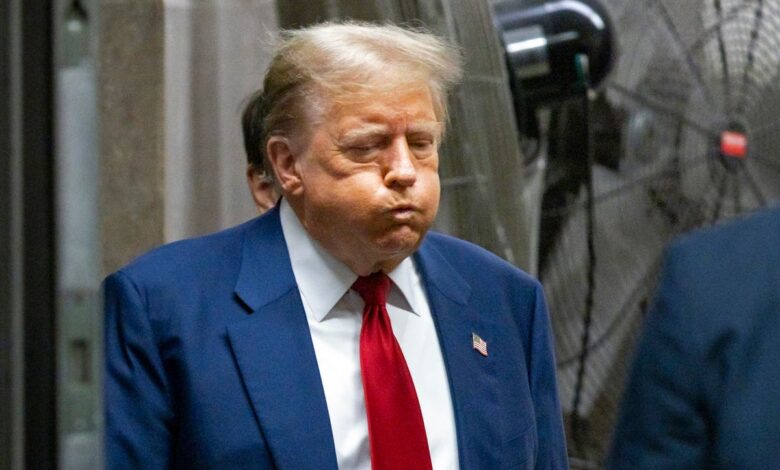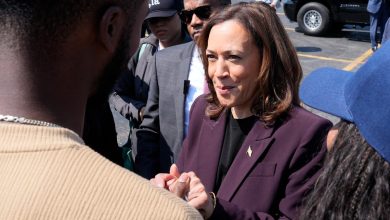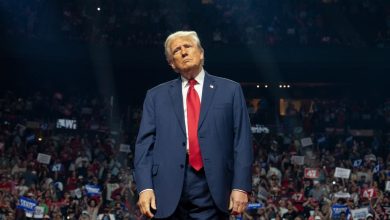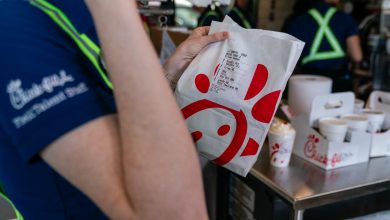Will Trump testify in his hush money trial – and should he? Experts weigh in

It would be yet another historic first for Donald Trump: a former president taking the stand to testify in his own criminal trial.
Currently staring down the possibility of jail time, Mr Trump appears to be toying with plans to take the stand and defend himself against allegations of a scheme seeking to influence the outcome of the 2016 presidential election.
The former president is charged with 34 counts of falsifying business records over a $130,000 payment to adult film star Stormy Daniels, to stop her from speaking out about an alleged 2006 affair in the lead-up to the election.
Mr Trump allegedly reimbursed his former “fixer” and attorney Michael Cohen for the hush money payment and then fraudulently logged it as legal expenses.
Prosecutors argue this is a case about election interference, with the man who later went on to win the 2016 election allegedly orchestrating the payment as part of a wider scheme to hide stories about his alleged indiscretions from voters. Mr Trump meanwhile denies the charges and that the affairs even took place.
Jurors have so far heard testimony from a number of key prosecution witnesses including former National Enquirer boss David Pecker, Ms Daniels’ former attorney Keith Davidson, ex-White House communications director Hope Hicks and Ms Daniels herself.
But, the big question is whether or not Mr Trump himself will take the stand.
Like all other criminal defendants, the presidential candidate does not have to testify at his trial but has hinted that he might.
In April, he was asked at Mar-a-Lago if it would be risky for him to take the stand.
“I don’t know, I’m testifying. I tell the truth,” he said at the time. “I mean, all I can do is tell the truth. And the truth is that there’s no case, they have no case.”
He later doubled down, telling reporters outside the New York courtroom that he wants to take the stand.
But later, after sitting through seven days of the trial, Mr Trump appeared to be getting cold feet. Calling into right-wing network Newsmax, he was asked if he still planned to testify based on what he had seen so far in the courtroom.
Appearing much more hesitant, Mr Trump responded: “Well I would if it’s necessary. Right now, I don’t know if you heard about today. Today was just incredible. People are saying – the experts, I’m talking about legal scholars and experts – they’re saying, ‘What kind of a case is this? There is no case’.”
With the prosecution approaching the end of its case, there are whispers that the former president will not take the stand. Judge Juan Merchan is proceeding with the case as if Mr Trump won’t, asking both sides to prepare for closing arguments on Tuesday 21 May.
The former president will need to let the court know on Monday.
So will Mr Trump make history by testifying in his trial? And, more crucially, should he?
The Independent spoke to two legal experts to get their insights into what impact his testimony might have on the jurors deciding his fate, how prosecutors could grill him if he takes the stand and what the former president’s legal team is likely urging their client to do.
What would the jury think?
For Steve Duffy, a jury consultant at Trial Behaviour Consulting, Mr Trump is in something of a “lose-lose” situation in the eyes of the jury, whether or not he testifies.
“Should he testify? That is a lose-lose proposition for many criminal defendants,” he tells The Independent.
But he thinks that’s “especially” true for someone like Mr Trump.
“Jurors generally don’t react well to criminal defendants not testifying, because it just leads to speculation about why – what do you have to hide?” he adds.
“The most important thing when someone does testify is their ability to control themselves and you’re talking about someone with a track record of the opposite of control when speaking publicly,” Mr Duffy says of Mr Trump, citing his penchant for lashing out at judges, their families, court staff, the prosecution, political opponents, reporters, and anyone else who may stand in his way.
The way Mr Trump speaks in public “violates all the golden rules of how to testify”, Mr Duffy adds.“Any misstatements can be used against you.”
Mr Trump has testified in some of his past civil cases, such as in the defamation trials brought against him by writer E Jean Carroll.
In those cases, it didn’t appear to work in his favour.
After hearing from him, federal juries found that he did defame Ms Carroll when he denied her rape allegations and he was ordered to pay her $83.3m in damages.
During one notorious moment in the first trial last year, the jury was played a video from Mr Trump’s deposition where he mistook an image of the former Elle magazine columnist for his ex-wife Marla Maples.
“This is someone who plays very loose and fast with the truth generally,” Mr Duffy tells The Independent.
“So the odds that he gets caught in a contradiction or undermines his own testimony I think would be very high.”
Attorney Duncan Levin, who worked at the Manhattan District Attorney’s Office years before the case against Mr Trump, tells The Independent that the jury will likely be keen to hear from the man himself – but won’t take kindly if he gets caught in lies on the stand.
“I think they will be quite keen to hear him out,” he says.
“I think jurors do like to hear from defendants on trial, but it’s their constitutional right not to talk and most defendants don’t.”
Asked about the possible benefits of testifying, Mr Levin says that Mr Trump would be able to testify about his intent, and argue that he wasn’t attempting to interfere in the election and that he was simply trying to “keep the details of his affairs private”.
That said, if Mr Trump does take the stand, he will have to “concede” several points such as false entries being made in the records at his direction, adding that a jury is unlikely to believe any testimony that it had “nothing to do with the election”.
“The defence is just trying to poke holes in the case, they’re looking for one juror who can say that the prosecutors did not meet their burden. And I think that his testimony won’t necessarily be helpful with that,” he adds.
Mr Duffy says Mr Trump is “the kind of witness who mortifies lawyers to put on because he’s so unpredictable [and] untethered to the truth in terms of what he says, [he’s] easy to provoke”.
“Jurors don’t like to see people get caught in lies,” he adds.
What could the prosecution do if he takes the stand?
Mr Levin thinks the former president will also get “destroyed” by prosecutors if he takes the stand.
Judge Juan Merchan ruled last week that the prosecution will be allowed to bring up prior rulings against Mr Trump if he chooses to testify, such as for fraud and defamation.
Prosecutors will also be able to bring up his repeated violations of gag orders, which have so far cost him $10,000 in fines.
But two federal rulings finding Mr Trump liable for sexually abusing Ms Carroll will not be part of the process. The prosecution will also not be allowed to bring up the monetary damages Mr Trump faces.
Mr Levin, who has represented figures such as Russian oligarch Oleg Deripaska, the ex-daughter-in-law of former Trump chief financial officer Allen Weisselberg, and disgraced movie producer Harvey Weinstein, tells The Independent that this has left the prosecution with a lot to throw at the former president on the stand.
“I think it’s exceedingly unlikely that he is going to testify for a number of reasons, he’s going to get absolutely destroyed on cross-examination,” Mr Levin tells The Independent.
“The judge has ruled that he will be able to be cross-examined about prior uncharged bad acts and some of the adverse court rulings against him. So the prosecutors have a lot to work with.”
What are Trump’s legal team advising?
Should he choose to testify, the defence can call him as a witness at any time after the prosecution rests its case.
“The prosecution has not been telling the defence about the order of their witnesses. That’s a two-way street, if he’s going to testify, they’re probably just going to call him as a witness without any warning at all,” Mr Levin says.
Based on his expertise as a defence attorney, Mr Levin believes Mr Trump’s legal team will advise him not to put himself on the stand.
“He has never shied away from speaking out, and there’s a distinct possibility that he will testify,” he says.
“But if he does, it will very likely be over the objection of his lawyers because it is not advisable in this case.”
Mr Levin notes that the judge may find that Mr Trump is lying in court, which could “enhance his sentence” and put him at risk of committing perjury.
The strength of the prosecution’s case will play a part in the defence’s strategy as to whether or not to put him on the stand, he explains.
While a strong case is likely to increase the chances that he’ll take the stand, a weaker case is a factor making it less likely that Mr Trump will testify but “I think in this case, they’re unlikely to recommend it at all”.
Mr Duffy argues that the very thing that makes Mr Trump’s supporters like him – that he speaks his mind – could be very dangerous on the stand, when he would be under oath.
“My guess is his lawyers are advising him not to testify, but he’s clearly driving the bus here, even the way they’re trying this case,” he says. “It’s almost like the political considerations are superseding the criminal considerations, just in terms of the way they’re approaching it.”
The Trump legal team is “taking on a lot of water” by arguing that Mr Trump did “nothing wrong”, Mr Duffy says.
Instead, they could rely on the high burden of proof for the prosecution, which needs to convince the jury that the former president is guilty beyond a reasonable doubt. They’re effectively raising the standard for their own case, he argues.
“I think the reason behind that is either ego or political considerations or some combination of the two,” he says.
The former president’s biggest problem, says Mr Duffy, is that he’s often unable to stop himself from lashing out.
“His persona is antithetical to how you typically want a witness to behave,” he says.
Whatever he decides, there’s no doubt that the jury, the court and the whole world will be enthralled.
As Mr Duffy says: “I’ve no doubt the entire courtroom will be enraptured – you’re not gonna see anybody falling asleep when Donald Trump is testifying.”







